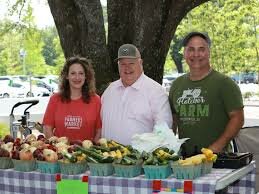Farmers urged to know costs when selling to consumers
University of Florida experts say that instead of taking what the broker or retailer feels like paying, small — and medium-sized farmers who sell directly to consumers should track costs, determine …
This item is available in full to subscribers.
Attention subscribers
To continue reading, you will need to either log in to your subscriber account, below, or purchase a new subscription.
Please log in to continueDon't have an ID?Print subscribersIf you're a print subscriber, but do not yet have an online account, click here to create one. Non-subscribersClick here to see your options for subscribing. Single day passYou also have the option of purchasing 24 hours of access, for $1.00. Click here to purchase a single day pass. |
Farmers urged to know costs when selling to consumers
University of Florida experts say that instead of taking what the broker or retailer feels like paying, small — and medium-sized farmers who sell directly to consumers should track costs, determine what they want to earn and set their produce prices.
Kim Morgan, a UF/IFAS associate professor of food and resource economics, says growers should base their prices on their costs.
“They have to know what they spend to know what they need to charge to cover costs and earn a profit,” said Morgan, a Southwest Florida Research and Education Center faculty member.
In a new Ask IFAS document, Morgan and co-author Jessica Ryals, the agriculture and sustainable food systems agent at UF/IFAS Extension, offer strategies for farmers who sell directly to customers.
For instance, retailers strategize what products to offer and when – a tactic farmers can mimic, Morgan said.
A small — to mid-sized grower is much more flexible and can respond faster to niche market demands and product diversification than a large one.
When farmers respond to changing consumer tastes and preferences, Morgan suggests they switch product offerings. They could grow new varieties of peppers or add herbs in the next season’s production cycle. They could even partner with animal producers to offer complete meal baskets at the following week’s farmer’s market.
Growers who sell straight to customers probably know some of them well.
“Farmers have closer relationships with the people who eat their food, so they can suggest new menu items and cooking styles, which is important, given peoples’ interests in trying new things, eating healthier and learning how to cook,” Morgan said.
Another tip: Growers should ask themselves why customers are making their purchases, the UF/IFAS experts say. For instance, why do we eat turkey primarily at Thanksgiving and Christmas?
“What about a ‘Christmas-in-July’ home-cooked meal, similar to clothing retailers’ summer sales events?” Morgan said.
Many experts’ suggestions involve marketing, which requires practice, particularly if you’re new to it.
“For instance, would a local TV ad get the attention of many people? Sure, but at what price? And if all those people showed up to buy, would you even have that much to sell them?” Morgan said.
Instead, Morgan and Ryals urge growers who sell directly to consumers to maximize the time and effort they spend on selling at farmers’ markets by asking their customers to:
Leave their business cards so the grower can create a customer list.
They can use a loyalty card to get a stamp every time they buy to get a discount after several purchases.
Review the grower on Google or Facebook.
Refer their friends to get a special deal when both make a purchase.
Follow them on social media, where the grower can promote products and services.
Morgan said the UF/IFAS grower business strategies can apply to any farmer.
For example, a large grower may sell most of their crops to a broker, but they could also sell some locally.
“It is all about diversifying your market channels, which lets you move volume at different prices and also minimizes your exposure to a downturn in any of those channels,” Morgan said. “People want to buy a basket of goods, just like they do at a retailer, so the farmer who can grow that and put it together with a personal touch wins.”
The mission of the University of Florida Institute of Food and Agricultural Sciences is to develop knowledge relevant to agricultural, human and natural resources and to make that knowledge available to sustain and enhance the quality of human life.










